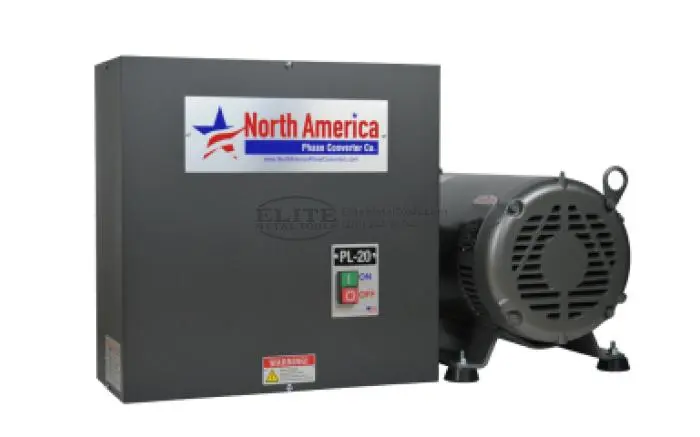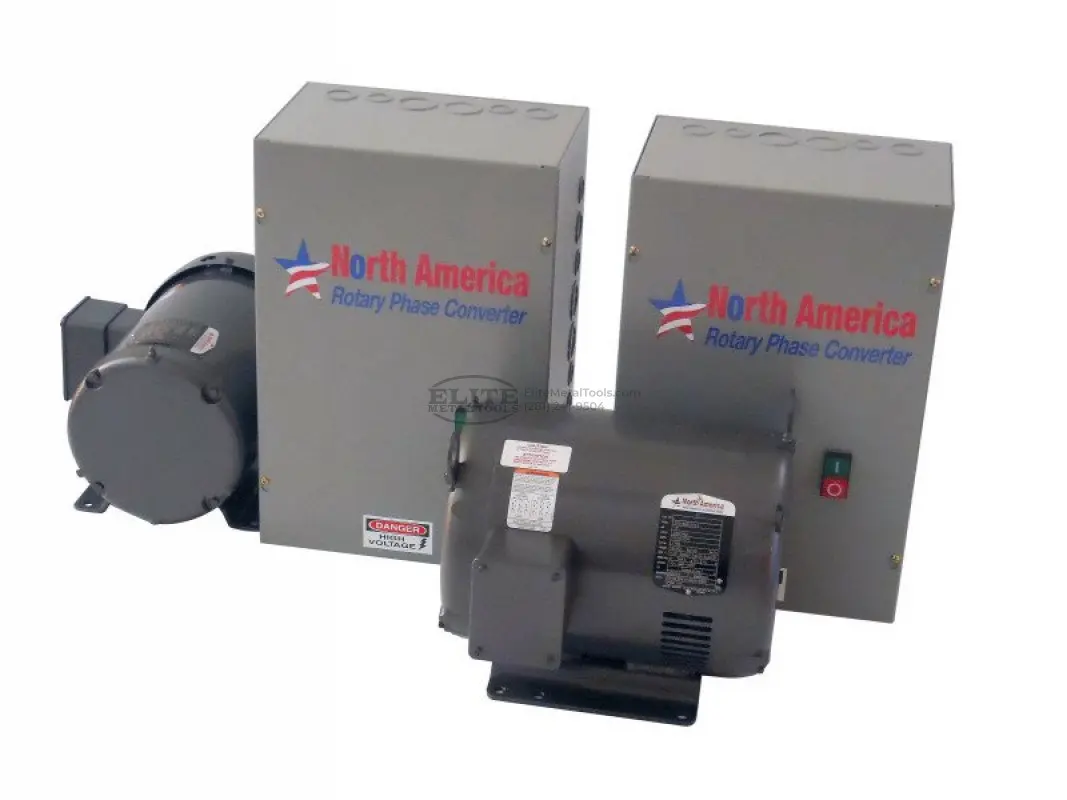Elite Metal Tools Articles
Industry news, tips, and updates on all things Elite Metal Tools
Understanding Phase Converters: History, Applications, and Future Trends
Phase converters are essential devices that convert single-phase power into three-phase power, enabling the operation of three-phase equipment and machinery. This comprehensive article explores the history of phase converters, different types, advantages, installation, maintenance, troubleshooting, applications across industries, energy efficiency considerations, safety measures, remote monitoring and control, case studies, and future trends. By the end, you'll have a thorough understanding of phase converters and their relevance in today's evolving landscape.
History of Phase Converters
The history of phase converters dates back to the early 20th century when the demand for three-phase power grew alongside the rise of industrialization. The initial phase converters were simple rotary converters that utilized spinning rotors and electromechanical components. Over time, advancements in technology led to the development of more efficient and reliable phase converters, including static and digital converters.
Types of Phase Converters
-
Rotary Phase Converters: Rotary phase converters are widely used and operate by generating a third phase from the single-phase power source. They consist of a rotating idler motor that acts as a third leg, providing the necessary phase conversion. Rotary converters are suitable for various applications, including workshops, small businesses, and residential use./product/8539
-
Static Phase Converters: Static phase converters, also known as electronic phase converters, use electronic components to create the third phase. They are cost-effective and simpler to install compared to rotary converters. However, static converters have limitations in terms of the power they can handle and are best suited for light to moderate loads.
-
Digital Phase Converters: Digital phase converters are a modern solution that uses advanced microprocessor technology to convert single-phase power to three-phase power. They offer precise and reliable phase conversion, making them suitable for sensitive and high-demand applications.
Advantages and Benefits
Phase converters provide several advantages and benefits:
-
Cost Savings: By converting single-phase power to three-phase power, phase converters eliminate the need to invest in expensive three-phase utility infrastructure, resulting in significant cost savings.
-
Equipment Compatibility: Many industrial machines and equipment require three-phase power to operate efficiently. Phase converters allow businesses to use existing single-phase power sources to power their three-phase equipment, eliminating the need for costly equipment replacement.
-
Energy Efficiency: Three-phase motors are known for their energy efficiency compared to single-phase motors. Phase converters enable the use of efficient three-phase motors, resulting in energy savings and reduced operating costs./product/8537
-
Flexibility: Phase converters provide flexibility in setting up and relocating equipment. They allow businesses to operate three-phase machinery in locations where three-phase power is unavailable or cost-prohibitive.
Installation and Maintenance
Proper installation and maintenance are vital for the optimal performance and longevity of phase converters. Here are some key considerations:
-
Sizing: Selecting the right size and capacity of a phase converter is crucial for reliable operation. Factors to consider include power requirements, motor horsepower, load characteristics, and future expansion plans.
-
Electrical Connections: Ensure that the phase converter is correctly wired and connected to the single-phase power source and the three-phase load. Follow the manufacturer's instructions and consult a qualified electrician if needed.
-
Cooling and Ventilation: Phase converters generate heat during operation. Ensure proper cooling and ventilation to prevent overheating and extend the lifespan of the converter.
-
Regular Maintenance: Follow the manufacturer's recommended maintenance schedule, which may include periodic inspections, cleaning, and lubrication. Regular maintenance helps identify and address potential issues before they escalate.
Applications in Different Industries
Phase converters find application across various industries, including:
-
Manufacturing: In manufacturing facilities, phase converters power machinery such as lathes, milling machines, and CNC equipment, enabling efficient production processes.
-
Agriculture: Phase converters play a crucial role in agricultural operations, powering irrigation systems, grain dryers, and farm equipment like pumps and motors.
-
Construction: Construction sites often lack three-phase power infrastructure. Phase converters provide a cost-effective solution for running heavy machinery, power tools, and welding equipment on-site.
-
Automotive: In automotive repair shops, phase converters power equipment like lifts, air compressors, and diagnostic machines, facilitating efficient vehicle servicing.
Troubleshooting Common Issues
While phase converters are generally reliable, occasional issues may arise. Here are some common problems and troubleshooting tips:
-
Voltage Fluctuations: Fluctuations in voltage can occur due to load imbalances or electrical issues. Ensure proper load distribution and consult an electrician to address any electrical problems.
-
Imbalance: Imbalanced current distribution can cause motor overheating and reduced efficiency. Verify proper wiring and balance the load across the phases.
-
Compatibility Issues: Some equipment may be sensitive to the waveform produced by certain types of phase converters. Ensure compatibility between the converter and the equipment, and consult the manufacturer if necessary.
Energy Efficiency Considerations
In addition to the numerous benefits, phase converters also contribute to energy efficiency:
-
Reduced Power Consumption: The use of three-phase motors powered by phase converters leads to lower power consumption compared to single-phase motors, resulting in energy savings.
-
Lower Operating Costs: By utilizing energy-efficient three-phase motors, businesses can reduce their overall operating costs and improve their bottom line.
-
Environmental Impact: The energy efficiency of phase converters helps minimize the environmental footprint by reducing energy consumption and greenhouse gas emissions.
Safety Measures
When working with phase converters, it's essential to prioritize safety. Consider the following measures:
-
Proper Grounding: Ensure proper grounding of the phase converter and connected equipment to prevent electrical hazards and protect against surges.
-
Electrical Safety Guidelines: Adhere to electrical safety guidelines, including using appropriate protective equipment, following lockout/tagout procedures, and working with qualified personnel when necessary.
-
Regular Inspections: Conduct regular inspections of the phase converter and associated wiring to identify any potential safety hazards or signs of wear and tear.
Remote Monitoring and Control
Modern phase converters often come equipped with remote monitoring and control capabilities, offering added convenience and efficiency:
-
Performance Monitoring: Remote monitoring allows users to track the performance of the phase converter, ensuring optimal operation and identifying any potential issues or maintenance needs.
-
Adjusting Settings: Users can remotely adjust phase converter settings, such as voltage, frequency, or load balancing, without the need for physical access to the device.
-
Real-Time Alerts: Remote monitoring systems can provide real-time alerts, notifying users of any critical events or abnormalities, enabling prompt action to address potential problems.
Case Studies
Examining real-life case studies can provide valuable insights into the practical applications and benefits of phase converters:
-
Case Study 1: Company XYZ, a manufacturing facility, implemented a phase converter system to power their CNC machines. The installation resulted in significant cost savings compared to upgrading to three-phase utility power, and the enhanced efficiency improved overall production output.
-
Case Study 2: Farm ABC utilized a phase converter to power their irrigation system, allowing them to irrigate their crops efficiently without the need for expensive infrastructure upgrades. This resulted in improved crop yields and reduced operational costs.
Future Trends
The field of phase converters continues to evolve, with several notable trends on the horizon:
-
Integration of Smart Features: Phase converters are increasingly incorporating smart features such as advanced monitoring capabilities, energy usage analytics, and connectivity to Industrial Internet of Things (IIoT) platforms for improved efficiency and performance.
-
Increased Automation: Automation is becoming increasingly prevalent in industrial settings. Phase converters are adapting to this trend by integrating automation features, such as remote control, programmable settings, and integration with other automated systems. This enhances operational efficiency and allows for seamless integration into advanced manufacturing processes.
-
Advancements in Energy Storage: As the demand for renewable energy sources grows, phase converters may incorporate energy storage capabilities. This would enable the capture and storage of excess energy during low-demand periods and release it during peak times, optimizing energy usage and reducing reliance on the grid.
-
Enhanced Power Quality: Future phase converters may focus on improving power quality, such as reducing harmonic distortions, voltage fluctuations, and power factor correction. This ensures the reliable and stable operation of connected equipment, leading to increased productivity and reduced downtime.
With these exciting trends on the horizon, the future of phase converters is poised to deliver even more efficient, intelligent, and environmentally friendly solutions to meet the evolving needs of industries.

